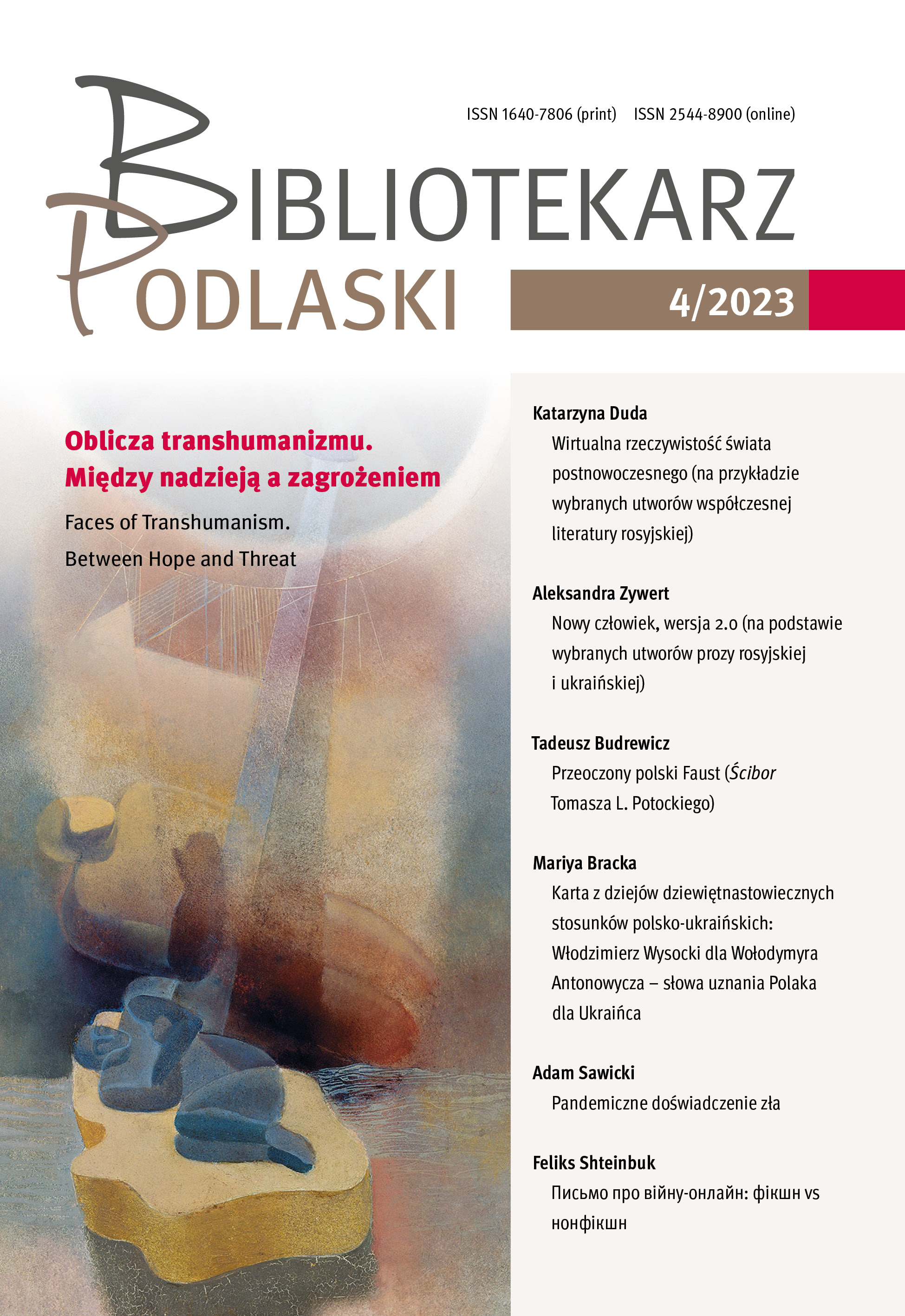Abstract
The main aim of the article was to demonstrate the similarities between Yevgeny Zamyatin’s novel We and Thea von Harbou’s Metropolis. The analysis reveals that these similarities are primarily evident in the depiction of space, plot, and character development. Regarding plot structure, female characters assume leading roles in both narratives. The antinomic pairs of women created by Zamyatin and Harbou surprisingly bring the two analyzed novels closer together. O-90 and Maria represent the archetype of the ideal mother ready for great sacrifices, embodying the power of creation. Conversely, I-330 and the false Maria are femme fatales, embodying the power of destruction. They become catalysts for social tensions. In their portrayal of these heroines, Zamyatin and Harbou draw upon Christian and mythological symbolism, creating distinctive images of the Virgin Mary and Lilith. Crucially, within these strongly masculinized worlds, women are the ones who actively initiate changes in their respective realities.
References
Alsztyniuk A., Antiutopičeskie proizvedeniâ Evgeniâ Zamâtina i Vasilâ Gigeviča: kprobleme shodstva i različij, „Studia Wschodniosłowiańskie” 2020, t. 20.
Aleksandrowicz P., „Metropolis” Fritza Langa jako pierwowzór i inspiracja współczesnych filmowych dystopii, [w:] Narracje fantastyczne, red. K. Olkusz, K.M. Maj, Kraków 2017.
Duda K., Antyutopia w literaturze rosyjskiej XX wieku, Kraków 1995.
Gałęziowski M., Uwagi na marginesie powieści „My” Eugeniusza Zamiatina, „Rusycystyczne Studia Literaturoznawcze” 1991, nr 15.
Garsiâ Sala I., Ženŝina-sozidatel´ i ženŝina-razrušitel´ v romane Evgeniâ Zamâtina „My”, [w:] Kobieta i/jako inny. Mit i figury kobiecości w literaturze i kulturze rosyjskiej XX–XXI wieku, red. M. Cymborska-Leboda, A. Gozdek, Lublin 2008.
Gildner A., Proza Jewgienija Zamiatina, Kraków 1993.
Harbou T., Metropolis, przeł. W. Zechenter, Warszawa 1927.
Huyssen A., The Vamp and the Machine: Technology and Sexuality in Fritz Lang’s „Metropolis”, „New German Critique” 1982, nr 24–25.
Juszczyk A., Stary wspaniały świat. O utopiach pozytywnych i negatywnych, Kraków 2014.
Kasperski E., O teorii komparatystyki, [w:] Literatura. Teoria. Metodologia, red. D. Ulicka, Warszawa 1998.
Kopaliński W., Słownik symboli, Warszawa 2012.
Magid A.M., Better than the Book: Fritz Lang’s Interpretation of Thea von Harbou’s „Metropolis”, „Spaces of Utopia: An Electronic Journal” 2006, nr 2, https://ler.letras.up.pt/uploads/ficheiros/1639.pdf [dostęp: 7.09.2023].
Maj K.M., Antyutopia – o gatunku, którego nie było, „Zagadnienia Rodzajów Literackich” 2019, t. 62, z. 4.
Maj K.M., Eutopie i dystopie. Typologia narracji utopijnych z perspektywy filozoficznoliterackiej, „Ruch Literacki” 2014, t. 55, z. 2.
Maj K.M., Utopia, czyli tam i z powrotem. O założeniach światotwórczych narracji eu- i dystopijnych,„Wielogłos. Pismo Wydziału Polonistyki UJ” 2014, nr 3.
Nefagina G., Evgenij Zamâtin (1884–1937), [w:] S. Gončarova-Grabovskaâ, G. Nefagina, I. Skoropanova, T. Aleška, Russkaâ literatura pervoj poloviny XX veka, Mińsk 2009.
Niewiadomski A., Smuszkiewicz A., Antyutopia, [w:] Encyklopedia fantastyki, http://encyklopediafantastyki.pl/index.php?title=Antyutopia [dostęp: 7.08.2023].
Orwell G., The Collected Essays, „Journalism and Letters” 1968, vol. 4.
Pomorski A., Posłowie, [w:] E. Zamiatin, My, przeł. A. Pomorski, Warszawa 1989.
Profferr C.R., Notes on the Imagery in Zamjatin’s „We”, „Slavic and East European Review” 1963, nr 3.
Ruppert P., Technology and the Construction of Gender in Fritz Lang’s „Metropolis”, https://www.colorado.edu/gendersarchive1998-2013/2000/11/01/technology-and-construction-gender-fritz-langs-metropolis [dostęp: 7.09.2023].
Russell R., Literature and Revolution in Zamjatin’s „We”, „Slavic and East European Review” 1973, nr 122.
Rymarz K., Femme fatale (2) – malarstwo wyrazem męskiego spojrzenia na kobietę, http://www.netkultura.pl/2191/katarzyna-rymarz-femme-fatale-2-malarstwo-wyrazem-meskiego-spojrzenia-na-kobiete/ [dostęp: 30.08.2023].
Sałajczykowa J., Z problematyki eksperymentu literackiego w rosyjskiej/radzieckiej prozie lat dwudziestych: powieść E. Zamiatina „My” jako utopia odwrócona, „Studia Rossica Posnaniensia” 1988, nr 1.
Samjatin J., Wir. Roman, Köln 1958.
Stępnik M., Sfinks i gorgony – ewolucja psychoanalitycznego bestiarium. Reinterpretacje, https://www.pismowidok.org/pl/archiwum/2023/wizualizowanie-psychoanalizy/sfinks-i-gorgony [dostęp: 30.08.2023].
Woodcock G., Utopias in Negative, „Sewanee Review” 1956, vol. 64.
Wróblewski W., Dwie antyutopijne wizje – „My” Jewgienija Zamiatina i „Miranda” Antoniego Langego. Z dziejów idei i recepcji, „Konteksty Kultury” 2020, nr 17, z. 4.
Zamiatin E., My, przeł. A. Pomorski, Warszawa 1989.
Zobek T., „My” Eugeniusza Zamiatina a Proletkult: o antyutopii i utopii lat dwudziestych, „Rusycystyczne Studia Literaturoznawcze” 1991, nr 15.
Żemła K., Organizacja stylistyczna powieści E. Zamiatina „My” wobec ewolucji stanu emocjonalnego bohatera, „Rusycystyczne Studia Literaturoznawcze” 1991, nr 15.

This work is licensed under a Creative Commons Attribution-ShareAlike 4.0 International License.
Copyright (c) 2024 Patryk Witczak


